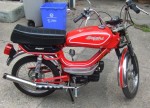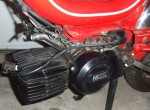 made in Italy by MZV
made in Italy by MZV 
Minarelli V1, V1H, V1L, C2, P4 engine
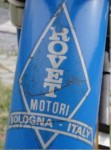 Fox made in Italy by Rovet
Fox made in Italy by Rovet 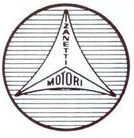
Zanetti front engine, friction-drive
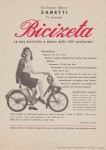
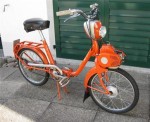
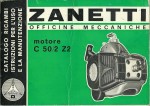
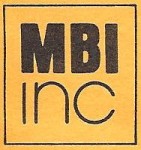
1. 2. 1970 Zanetti Bicizeta, 3. 1960’s Zanetti motor, 4. MBI
Safari is a trade name made by Motor Bike Imports, Inc (MBI), 6005 S Route 130, Pennsauken NJ 08110. MBI began in 1964-65 as First American Bicizeta, Inc, importing the popular Italian motor bike Bicizeta, a front engine, friction drive, pull start, 50cc automatic, made by Motori Zanetti of Bologna Italy.
Most Safari mopeds were sold at eastern US moped shops, mostly New Jersey, Maryland, and Florida. Almost none were sold in California, so Myrons Mopeds has no Safari literature or Safari-specific parts.
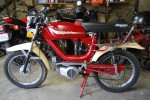
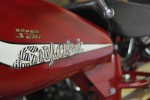
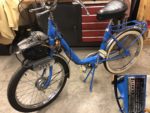
1. ’79 Safari Super Scat, 2. ’79 Safari Super Scat, 3. Rovet, 4. ’75 Safari Rovet
Scat: In 1968-69 MBI contracted MZV of Bologna Italy to produce mini-bikes and mini-cycles using the Zanetti engines. They were given the brand name Safari Scat. Apparently the Safari Scat mini bike line of the early 1970’s included or became street legal full size mopeds with off road tires and fenders by around 1979. There are currently no pictures or details of those early Safari Scat mini bikes. There is only this 1979 Safari Super Scat.
Rovet: In the early 1970’s MBI went in partnership with an Italian engineer and started their own bicycle manufacturing company, named Rovet. In 1975 Rovet made the Safari Rovet, using the Zanetti front engine. Unlike the Bicizeta that was a folding step-thru frame, the Rovet was non-folding. It produced 1 hp, went about 19 mph, and was DOT approved for US streets.
The Rovet gas tank was the main frame tube, with a petcock down near the pedals. The fuel tank is lower than the engine, and so a fuel pump is required to supply fuel to the carburetor. A supply hose from the petcock goes to the pump. A hose from the pump goes to the carburetor. The Dellorto SHA float type carburetor only lets fuel in when it is needed. The excess fuel supplied by the pump is returned back to the fuel tank. So a return hose goes from the carburetor to the top of the fuel tank.

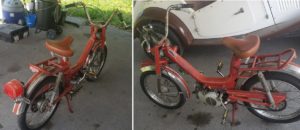
1. ’75 Safari Ridget, 2. ’75 Safari Super Extra
Ridget and Super: In 1975-76 MBI began to import complete mopeds, made by MZV with Minarelli V1 engines.
They were called Safari Ridget (no speedometer, painted fenders, no rear suspension, solo seat), Safari Super (stainless steel stripe fenders, F and R suspension, solo seat), and Safari Super Extra (speedometer, stainless steel stripe fenders, chrome rear coil springs and motorcycle type fork). Early Safari Super Extra had a solo seat. After mid-1977 they had a nicely sculpted long seat.
Fox: In 1976 the front-engine Rovet became the Fox. Two thin frame top-tubes were added. That made it no longer a step-thru frame.
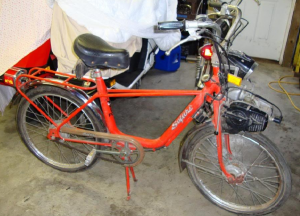
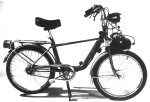
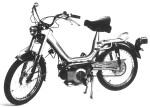
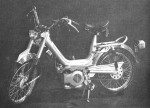
1. ’76 Safari Fox, 2. ’76 Safari Fox, 3. ’76 Safari Super, 4. ’76 Safari Super
1976 Safari: engine fenders wheels controls special features
Safari Fox Zannetti front engine, friction drive, 1hp 20mph
Safari Ridget Minnarelli V1 painted spoke wheels Domino step-thru
Safari Super Minnarelli V1 stripe metal spoke wheels Domino step-thru
Safari Super Extra Minnarelli V1 stripe metal spoke wheels Domino step-thru
The heavy DOT tail lamps were too much for the thin stainless steel rear fender. The fender would eventually break at the tail light mount holes. To fix this, Safari had the 1977-later frames made with a large 1″ x 2″ steel washer welded to the back frame bar. The tail lamp was relocated there.
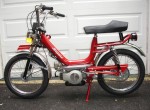
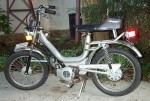
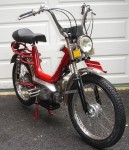
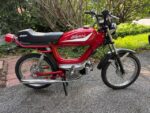
1. ’78 Safari Super Extra restored by Bill Small
2. ’78 Safari Super Extra
3. ’78 Safari Super Extra restored by Bill Small
4. ’78 Safari 300MT restored by Bill Small
These early Safari’s, from 1976 until mid-1978 all had the Minarelli flattened can type exhaust, nicknamed “pancake exhaust”. Most were the 40kph (26mph) speed version for Italy, which was OK for either 25 or 30mph US states. Some were 20mph versions with a different piston, a smaller carb, 9mm instead of 12. After mid-78 they had long exhausts, which upped the speed from 26 to 29mph.
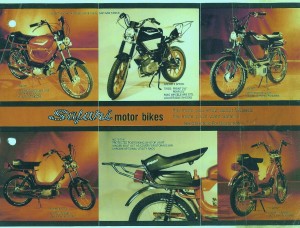
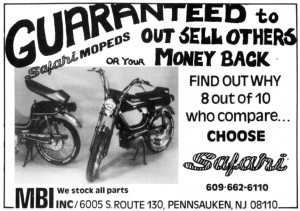
1978 Safari: engine fenders wheels controls special features
Super Extra Minnarelli V1 stripe metal spoke wheels Domino step-thru
300 MT Minnarelli V1 stripe metal spoke wheels Domino top-tank
400 MT Minnarelli V1 black plastic spoke wheels Domino top-tank
Cobra Minnarelli V1 stripe metal spoke wheels Domino step-thru wide tank
Commando Minnarelli P4 black plastic mag wheels OSL top-tank
New Safari models for 1978 had motorcycle style top mounted gas tanks. New model names were 300 MT and 400 MT (for Motorcycle Tank). The motorcycle tank models were more popular, in the US, than the step thru versions. 400MT was called Convertible because the top tank could be removed and the frame gas tank could be used instead. The 300MT did not have a frame tank.
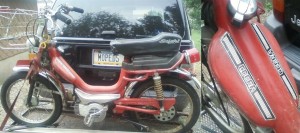
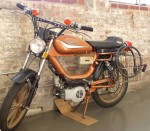
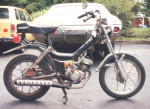
1. ’78 Safari Cobra, 2. ’78 Safari 400MT, 3. ’78 Safari Commando
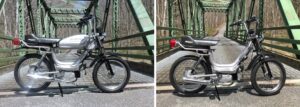
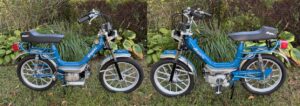
1. ’80 Safari 400MT, masterfully restored by Bill Small in MD.
It easily converts to a step-thru with a gas tank in the frame.
2. ’79 Safari Super Extra, another fine Bill Small restoration.
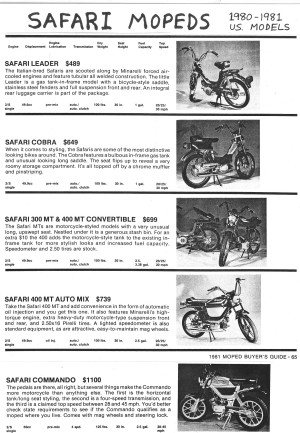
1980 Safari: price engine fenders wheels controls special features
Leader $459 Minnarelli V1 stripe metal spoke wheels Domino step-thru solo seat
300MT $599 Minnarelli V1 stripe metal spoke wheels Domino top-tank
400MT $699 Minnarelli V1 black plastic mag wheels OSL top-tank
Automix $739 Minnarelli V1? black plastic mag wheels OSL top-tank, oil injection
Cobra $649 Minnarelli V1 stripe metal spoke wheels Domino step-thru wide tank
Commando $1100 Minnarelli P4 black plastic mag wheels OSL top-tank

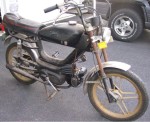

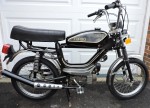
1. ’81 Safari Commando, 2. ’83 Safari Variomatic, 3. ’85 300MT Turbo, 4. ’85 300MT restored by Bill Small
New for 1983-84 is the Minarelli C2 “continuous two speed” engine, on the Safari “Variomatic”. It has a variable belt pulley system, where one pulley gets bigger while the other gets smaller, continously. It is called a CVT continuously variable transmission. The result: quicker take off and better hill climbing!
1984 Safari: engine fenders wheels controls special features
Safari 300MT Turbo Minnarelli V1-H stripe metal spoke wheels OSL top-tank
Safari 400MT Turbo Minnarelli V1-H black plastic mag wheels OSL top-tank
Safari Variomatic De Lux Minnarelli C2 plain metal mag wheels OSL top-tank
Safari Commando Minnarelli P4 black plastic mag wheels OSL top-tank
1984-85 began the newer Minarelli V1-H engine, improved with an aluminum cylinder and more cooling fins. This eliminated the need for the fan and the fan shroud. The V1-H still had the piston port intake design of the older V1. The case ID has a cast “V1”, plus a stamped “H” after it.
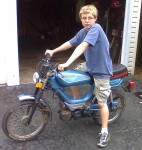
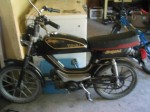
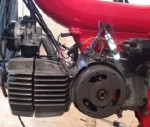
1. ’86 Safari 300MT Turbo, 2. ’86 400MT Turbo, 3. ’87 300MT Turbo, Minarelli V1-H, alu. cylinder
With the floorboards on, the Minarelli V1-H looks exactly like a later V1-L. But look under the floorboards and you can see the intake goes in to the cylinder, not into the crankcase, like on the V1-L “case reed” engine.
1988 Safari: engine fenders wheels controls special features
Safari 300MT Turbo Minnarelli V1-L stripe metal spoke wheels OSL top-tank
Safari 400MT Turbo Minnarelli V1-L black plastic mag wheels OSL top-tank
Safari Commando Minnarelli 4-speed black plastic mag wheels OSL top-tank
The V1-L one speed case reed engine had more take-off power and torque to climb hills than the V1-H piston port. So there was less need for all the complexity, extra cost and extra weight of the Minarelli C2 two speed engine.
Note that Safari mopeds did not say the model name anywhere. As a result, many people call their Safari mopeds the maker name, MZV, since that is the only other name on the frame. Also the model name MZV is used because it is what Safari’s are called in Italy and Europe. There is very little information about MZV in the Wheels of Italy pages, or anywhere else.
Safari lasted much longer than most US brands, 1975 to about 1991. Thanks to, and hats off to, Mr. John Oddone, for the info about his father’s company MBI, and Safari early models and history.
Other MZV Models Non-US
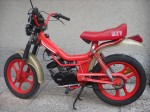
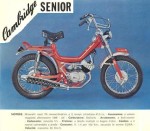
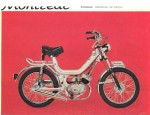

1. ’86 MZV Cobra, 2. ’76 MZV Cambridge Senior,
3. ’72 MZV Cambridge Montreal, 4. early 70’s MZV Cambridge
Safari Info
Here is a 1980 Safari Owners Manual. Thanks to Moped Central.
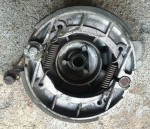
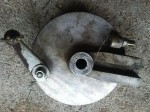
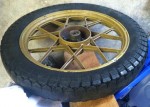
1. Safari 118 x20 brake, 2. Safari 118mm front plate alum. casting can crack
3. 1981 Safari Commando Grimeca 16 x 1.60 118mm brake drum
These Safari brake pictures are for reference. These brakes are also for 2001-03 Tomos A35 Revival rear. See Brakes 118 x 20 Grimeca
 Safari components: Minarelli V1, V1-H, V1-L engine, or Minarelli 4-speed, Dellorto SHA 14/12 carburetor (V1 engine), CEV lights, CEV plastic slider switches, OSL controls, Grimeca hubs and 90mm brakes or 118mm drum Razze Incrociate style mags (Commando model), CEV speedometer with LH driver. The Safari Super Extra frame has a 40mm push-in gas cap.
Safari components: Minarelli V1, V1-H, V1-L engine, or Minarelli 4-speed, Dellorto SHA 14/12 carburetor (V1 engine), CEV lights, CEV plastic slider switches, OSL controls, Grimeca hubs and 90mm brakes or 118mm drum Razze Incrociate style mags (Commando model), CEV speedometer with LH driver. The Safari Super Extra frame has a 40mm push-in gas cap.

